
And more dogs.
I was stopped in my tracks at the very beginning of Jon Lee Anderson’s New Yorker article on Chile’s new president:
February in Santiago, the capital of Chile, is like August in Paris: the end of summer, when everyone who can afford a vacation escapes for a last gasp of freedom. Many santiaguinos go to the nearby Pacific beaches, or to the chilly lakes in the south.
I was struck by santiaguinos, so I turned to my trusty Diccionario de gentilicios y topónimos (see this LH post) and found that, sure enough, that’s the name for people from Santiago de Chile. The reason it sounded odd to me is that people from Santiago del Estero in Argentina (the country where I went to high school) are called santiagueños, as are those from the Santiagos in Ecuador and Panama. But someone from Santiago in Cuba or the Dominican Republic is a santiaguero, while an inhabitant of Santiago de Compostela in Spain is santiagués. Just to mix things up, someone from Santiago de Cacem in Portugal is mirobrigense, while a person from Santiago Millas in Spain is a maragato. Gentilicios are complicated, but I love ’em!
A side note: people mock the New Yorker’s fossilized diereses in words like coöperation and their Anglophilic preference for got as the past participle of get, but I shrug those off as charming quirks; the article’s “biographies of Chilean Presidents,” however, seriously bothers me. President, like other titles, should be capitalized before a name (President Joe Biden) but not otherwise. I deprecate this folderol!
Keith Kahn-Harris, featured here in The Languages of Kinder Surprise earlier this year, writes for Psyche about the pleasure to be had in not understanding a language:
[…] I haven’t lost this heady, even mystical, faith in the possibilities of meeting and talking with the other. But more recently I’ve sought to understand how similarly transcendent possibilities can arise from not talking with the other, or even being able to understand their voice. Philosophically and theologically, I’ve subscribed to Martin Buber’s ideal of working towards ‘I-Thou’ encounters, in which we each meet the other mutually as authentic individuals, without objectification or qualification.
Here we come back to the Kinder Surprise. I love to peruse scripts I cannot understand, signs I cannot parse: Czech diacritics, the loops and curves of Georgian, the intricacies of Chinese characters, the elegant fluency of Arabic. In my book The Babel Message: A Love Letter to Language (2021), I went further, commissioning dozens more translations of the Kinder egg message into tongues as out of the way as ancient Egyptian and Klingon. My passion for not understanding language releases me from the effort of comprehension, freeing me to revel in the manifold sounds the human mouth can make, the tiny nuances the pen produces on paper. It made me wonder if Buber’s ‘I-Thou’ encounter might not require any dialogue at all? What if his concept of ‘dialogue’ – which he contrasts with the ‘I-It’ instrumentalism and objectification of ‘monologue’ – could be taken non-literally? […]
This may all seem abstract and high-minded, but the pleasures and potential of not understanding languages are very real. Consider this rendering of the Kinder Surprise warning into Dzongkha, the national language of Bhutan, written in a version of Tibetan script:
ཉེན་བརྡ། ཨ་ནིཡི་གུ་འདི་ ལེགས་ཤོམ་སྦེ་ ལྷག་ཞིནམ་ལས་ བདག་འཛིན་ཐབས་སྟེ་ བཀའ་དྲིན་བསྐྱང་གནང་། ཨ་ལུ་སྐྱེས་ལོ་གསུམ་མན་ཆད་ཚུ་གིས་ དོན་ལུ་འོས་འབབ་མེད་ཨིན། ག་དེམ་ཅིག་སྦེ་ རྩེདམོ་རྩེད་བ་ཅིན་ རྩེདམོ་གིས་ཅ་ཆས་ཚུ་ ལྐོད་མར་གཏང་ནི་ ཉེན་ཁ་ཡོདཔ་ཨིན།
To me, this is as delightful to contemplate as any art form. Its elegance and delicacy completely belie the dreary austerity of the message it communicates. To someone from Bhutan, it’s an everyday message; to me – who cannot understand it – it is a startling reminder of how, to put it in non-Levinasian terms, human beings are awesome. Maybe I am reminded of my own awesomeness too; since my everyday language may, to an other, be an incomprehensible delight.
Nothing comes without danger though. Finding pleasure in the incomprehensible language of others, no matter how profound a Levinasian/Buberian encounter it offers, can be twisted into the very objectification both philosophers abhorred. A middle-aged white man extolling Dzongkha script risks repeating the patronising discourse of imperialism, and treating the non-white other as someone capable of producing beauty almost despite themselves (while incapable of telling us anything that would challenge our superiority). In a small way, I know what it is to be linguistically patronised: on visits to the US Midwest, people have told me how much they love my English accent. I have no doubt it is genuinely felt, but it feels like I am being treated as a pet.
Appreciating languages we do not understand takes work, if it is to contribute to a Levinasian encounter with otherness. That work involves interrogating the associations that an incomprehensible language holds, in order to release oneself from them. Aware of the dangers of orientalism and imperialism, I try to purge myself of images of snow-capped mountain tops and chanting monks when I contemplate Dzongkha. I try to see it as functionless, placeless art. While that effort can never be entirely successful, like Levinas’s entire ethics, it is an effort worth making because it opens the door to ‘linguistic civility’. […]
To work towards linguistic civility is to work towards overturning the Babel myth. It is to see the confusion of tongues as a reminder of our mutual capacity for language, not as a reproach to our common humanity. From the vilest online troll to the saintliest of peacemakers, we are all other to each other, and, when we speak without being understood, we celebrate the possibility of otherness to highlight our connectedness.
We all have it in us to find ways of revelling in languages we do not understand. It can happen in humble ways, such as enjoying the unfamiliar speech of the radio station playing in a taxi. Or in those moments of being overwhelmed and awestruck at the incomprehensible street in a foreign land. It can happen when we linger on the Chinese characters in a restaurant, rather than on their English translation. All that is required is releasing oneself from the pressure to achieve literal understanding, and letting oneself embrace a much deeper understanding.
He gets carried away with his own rhetoric to the point of verging on woo, but it’s still interesting stuff to think about, and that Dzongkha is indeed a pleasure to contemplate. Thanks, Jack!
Yuval Pinter"Testing Limits"
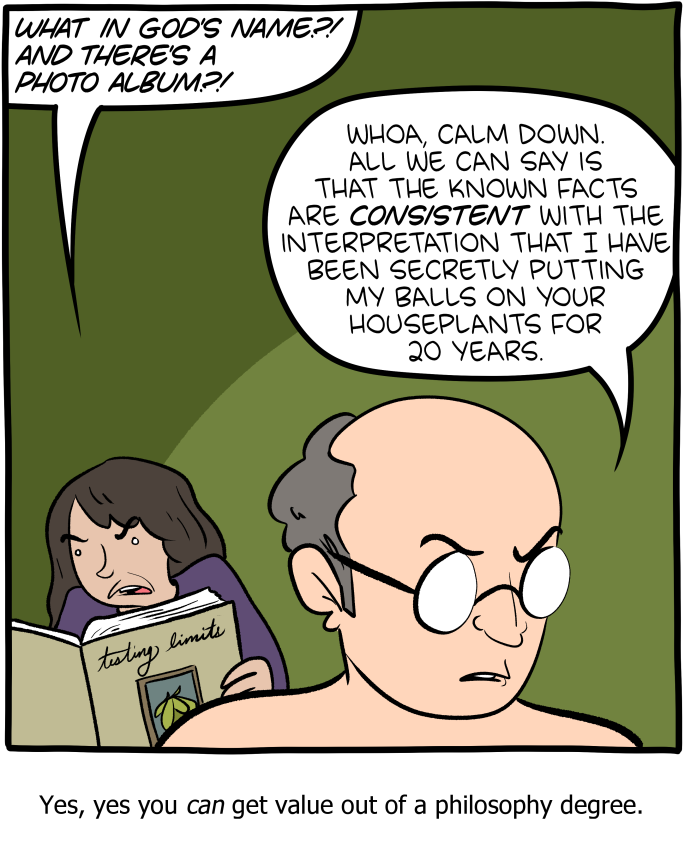
Hovertext:
Correlation doesn't imply causation! Induction is impossible! Hand me my briefs!
We now take a break from comics about aliens finding humans being weird to one about humans being weird.
Last time I wrote a post here I was surprised how many weirdos wrote in to tell me they still read the blog. Well, I'll just let you weirdos know that the amazing kids' book I've been working on for a year is finally (almost) heading toward the presses. I'm hopeful we'll be able to reveal more soon.
<3
Zach
זוכרים שהיתה מגפת קורונה? דגש קל, כאן בשביל לעורר מחדש את תחושת הכיף.
לאורך המגפה ליווה אותנו הביטוי המיופמז-משהו ״חולה מאומת.ת״, שהתקצר ברבות הימים לפשוט ״מאומת.ת״. לכאורה, לפי התפיסה האפיסטמית שלי לפחות, מה שקורה זה דבר כזה: בת אנוש חושדת מסיבה כלשהי שהיא נשאית של נגיף הקוביד-י״ט, ואם נמצאה חיובית בבדיקה מהזן החביב עליה מצבה משתנה והחשד אומת. מעתה ואילך היא חולה/נשאית מאומתת.
אלא שאתםן קוראותים כרגע פוסט בבלוג הבלשנות המוביל בישראל דגש קל, ולכן נהיר לכןם שמשהו חרג מהתפיסה האפיסטמית שלי. ואמנם, שופופו את הפסקה להלן בהכתבה מתוך מעריב מספטמבר 2020 (לא, לא כאן נתקלתי בזה במקור, אלא ״איפשהו״ ומזמן כבר שכחתי איפה):

אלדד שביט מצוטט כאומר ״ביום חמישי לא ידעתי שאני מאומת״. בעיניי משפט כזה לא ייתכן, כי אם ביום חמישי הוא לא ידע אזי ביום חמישי הוא לא היה מאומת (יש כאן אולי פתח להתפלספות במקרה שבחמישי הבדיקה כבר התבצעה ואולי איזשהו גורם בשרשרת הטיפול בדגימה המזוהמת כבר ידע את העניין וסתם לא הודיע לחולה עצמו עדיין, אבל נניח לה כי גם מאנשים שטרם נבדקו בתאריך המוזכר כבר שמעתי את זה). מה שקרה כאן די ברור וכבר נתקלנו בו רבות – הסמנטיקה הבסיסית של השורש א-מ-ת נגזלה מהמילה ״מאומת.ת״, שקיבלה חיים משלה כפחות-או-יותר מילה נרדפת ל״נשא.ית״. לא סטטוס הידע שלנו אודות הנגיף הוא החשוב כאן, אלא עצם הימצאותו בגופנו.
ונשאיר את קוראינו עם הציטוט הלא-בלתי-קשור-לחלוטין של מוסא אלפרון משלהי שנות ה-90: ״כבר 12 שנה שאין לי עבר פלילי״.
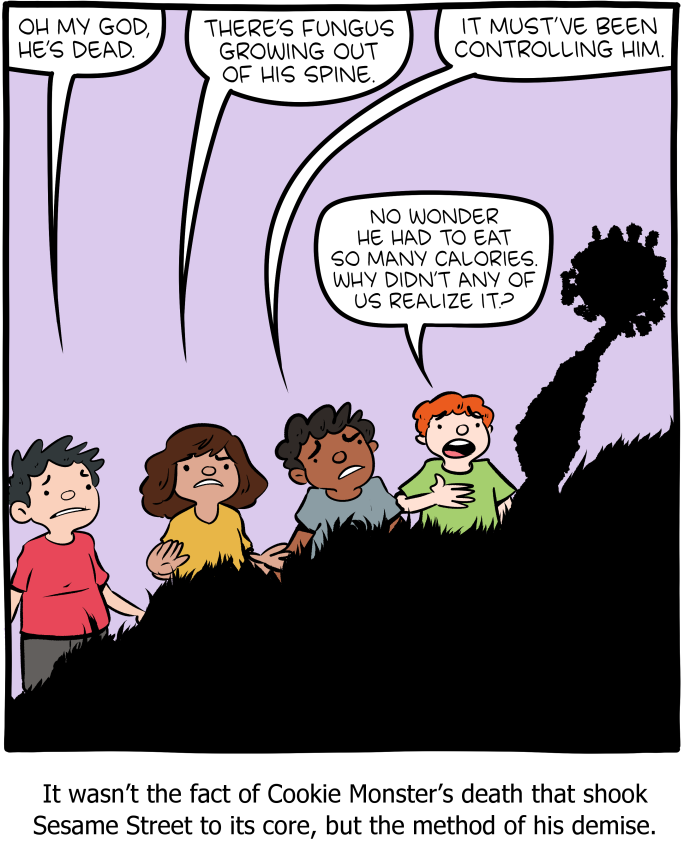
Hovertext:
A tip of the hat to Patreon subscriber Brad Porter whose 'C is for Cordyceps' I cannot excel in this hovertext.
.docx and .xlsx can only be read on a small subset of devices and only after purchasing a license. It is frankly a bit rude to expect everyone to have such licenses in 2022 given the proliferation of superior, and free, alternatives. If the document is static, read-only content, convert it to a PDF. If it’s something you want me to edit or comment on, or which will be changing with time, send me the document via Microsoft 365 or the equivalent Google offerings. Or a Git repo. Sorry to be grumpy but everyone should know this by now. If you’re still emailing these around, please stop.
Geoff Pullum has a typically invigorating review of the new second edition of Randy Allen Harris’s The Linguistics Wars: Chomsky, Lakoff, and the Battle over Deep Structure; here are a few excerpts:
It is quite difficult to explain in nontechnical terms what triggered the linguistics wars, but let me try. Chomsky in the mid 1960s maintained that the structures of sentences were nowhere near as simple as the sentence diagrams of yesteryear; they were more like sequences or layers of such diagrams. The most concrete layer, called the surface structure, captured facts about the overt shape of the sentence (word order, inflection, and pronunciation). More abstract layers accounted for things like connections between sentences — relations between active and passive clauses, for example. […]
However, from about 1967 some of Chomsky’s earliest defenders and most talented students began to develop arguments undercutting his case for “Deep Structure.” They claimed it had no theoretical necessity or significance. Instead, they posited much more abstract syntactic layers, and suggested that the most abstract layer of all looked much like what philosophers would call the “logical form” of a sentence. Their hypothesis was dubbed “Generative Semantics” (GS). […] GS emerged directly out of Chomsky’s work, using the kind of arguments he used, but it diverged from his own views, and displeased him. In his view this meant that the promoters of GS had to be defeated and punished.
The punishments Chomsky imposes on publicly announced enemies of his views are of two types: the dungeon and the fire.
Consigning an opponent to the dungeon of ostracism and obscurity is easier than you’d think for someone of Chomsky’s extraordinary prestige. His close followers, who dominate the mainstream of syntactic theory in America, tend to cite only what he cites, so if he resolutely avoids mention of someone’s name, within the mainstream it will soon look as if neither that person nor their publications even exist. (Today, when citation counts affect hiring and promotion, that can hurt more than the victim’s pride.)
The citational oubliette worked well for lesser-known or younger GS proponents, especially from low-prestige or foreign institutions. For example, in half a century the extensive and highly relevant works of brilliant European theorists such as Pieter Seuren and Esa Itkonen were never referred to in Chomsky’s voluminous writings, because he had identified them early on as enemies.
But more visible proponents, especially those close to Chomsky’s home institution, MIT, faced something more like burning at the stake. Chomsky would immolate their ideas in classes (scores of visitors would travel long distances to absorb his wisdom at MIT each Thursday afternoon), in conference presentations and invited public lectures around the world, and in the many articles and books he produced. He excoriated, misrepresented, and ridiculed his enemies, sometimes in their presence, calling their positions incoherent, irrelevant, or possibly just muddled equivalents (“notational variants”) of his own. He would attribute to his opponents views they rejected, even when they were present and tried to demur. […]
By around 1976, GS proponents could see that they had lost. GS had been crushed in an ideological struggle between an intellectual superstar whose followers saw him as infallible and a foolhardy clique that had dared to depart from the true faith.
Some on the losing side, worn down by a decade of struggle, looked like has-beens, which meant they could be transferred to the other punishment mode: total denial of citation. George Lakoff was tough enough to take Chomsky’s attacks, shake them off, move to Berkeley, and start a new life writing about metaphor and politics instead. But Chomsky’s former star student John Robert Ross was cowed and sidelined, and largely ceased publishing on syntax (a pretext was found for forcing him out of his tenured faculty position at MIT). James McCawley continued writing GS-influenced works from his independent base at the University of Chicago but was increasingly ignored by the mainstream. […]
Harris quotes Shakespeare’s amusing vignette of Hamlet persuading the sycophantic Polonius that a certain cloud is shaped like a camel, then getting him to agree it is like a weasel instead, and then that it resembles a whale. True Chomsky followers show their Polonius-like loyalty through unquestioning acceptance of each new image Chomsky sees in the theoretical cloud. They adopt the buzzwords, modify the direction of their own work, and pursue the new line — only to be left high and dry eight to ten years later when once again he demolishes the central pillars of the previous conceptual edifice.
Another practice of Chomsky’s is to plunder the work of his opponents for attractive ideas and useful terms to be adopted without credit a decade or two after he first attacked them as misguided. In recent years he has mined the program of GS for insights without crediting the original developers. Around 1990 he completely abandoned his “Deep Structure” level without a word about this being the central proposal of GS in 1967. His “minimalist program” posits a unified rule system relating logical forms directly to surface forms of sentences, a position GS proponent Paul Postal explicitly advocated in 1969, when Chomsky hotly rejected it. Chomsky never mentions that adopting the philosophers’ term “logical form” for the most abstract level of sentence representation was George Lakoff’s idea.
It’s hard to stop quoting, but if you want more just click on through; I know I’ve bashed Chomsky a lot and quoted a lot of bashing by others, but I was traumatized by him and his minions at a formative age and can’t get enough. I got the link via Mark Liberman’s Log post, where David Marjanović left this comment:
The latest shot in the linguistics wars: an open-access paper on how language can indeed be learned from input alone.
Venceremos!
מברשת שיניים חשמלית.
הלחם של “מברשת” ו-“רטט”.
“אויש! שכחתי להטעין את המברטט, עכשיו זאת סתם מברשת רגילה.”
“זהו, הגיע הזמן להחליף מברשת שיניים, אולי הפעם אבחר דווקא במברטט.”
נתרם ע”י: ירון שהרבני.
מקור: ירון שהרבני.
Yuval Pinterpreach
It’s a bunch of lists of words some guy’s trying to sell. They’re not even very good lists. You can just make your own domain-appropriate word lists in your language of choice.
A striking example of the post-modifier attachment ambiguity: "Police officer jailed for attacking members of the public found dead", The Guardian 12/29/2021.
Bob Ladd, who sent in the link, spent "quite a few hundred milliseconds" puzzling about why the police officer had attacked dead people.
The Berkeley parser gets the attachment even more wrong, construing the headline to refer to "members of [the public found dead]":
I've labelled the three NPs that could be post-modified by "found dead" — and the correct answer would have been #3, the police officer.
The Stanford dependency parser decides on #2 as the modified NP:

And spacy puts the attachment a bit further to the left (though still not in the right place), but still gets the parse wrong, construing "jailed" rather than "found" as the main verb:
Dep tree Token Dep type Lemma POS
──────────────────── ───────── ──────── ─────── ──────────
┌─► Police compound police NOUN
┌─►└── officer nsubj officer NOUN
┌┬┬───────────┴───── jailed ROOT jail VERB
││└─►┌────────────── for prep for ADP
││ └─►┌─────────── attacking pcomp attack VERB
││ └─►┌──────── members dobj member NOUN
││ └─►┌───── of prep of ADP
││ │ ┌─► the det the DET
││ └─►└── public pobj public NOUN
│└──────────────►┌── found advcl find VERB
│ └─► dead oprd dead ADJ
└──────────────────► . punct . PUNCT
The obligatory screenshot:

Hovertext:
As I post this, I suddenly regret not drawing a brutal murder seen where the dad writes 'worth it' in his own blood.
Yuval Pinterprimo bonus panel
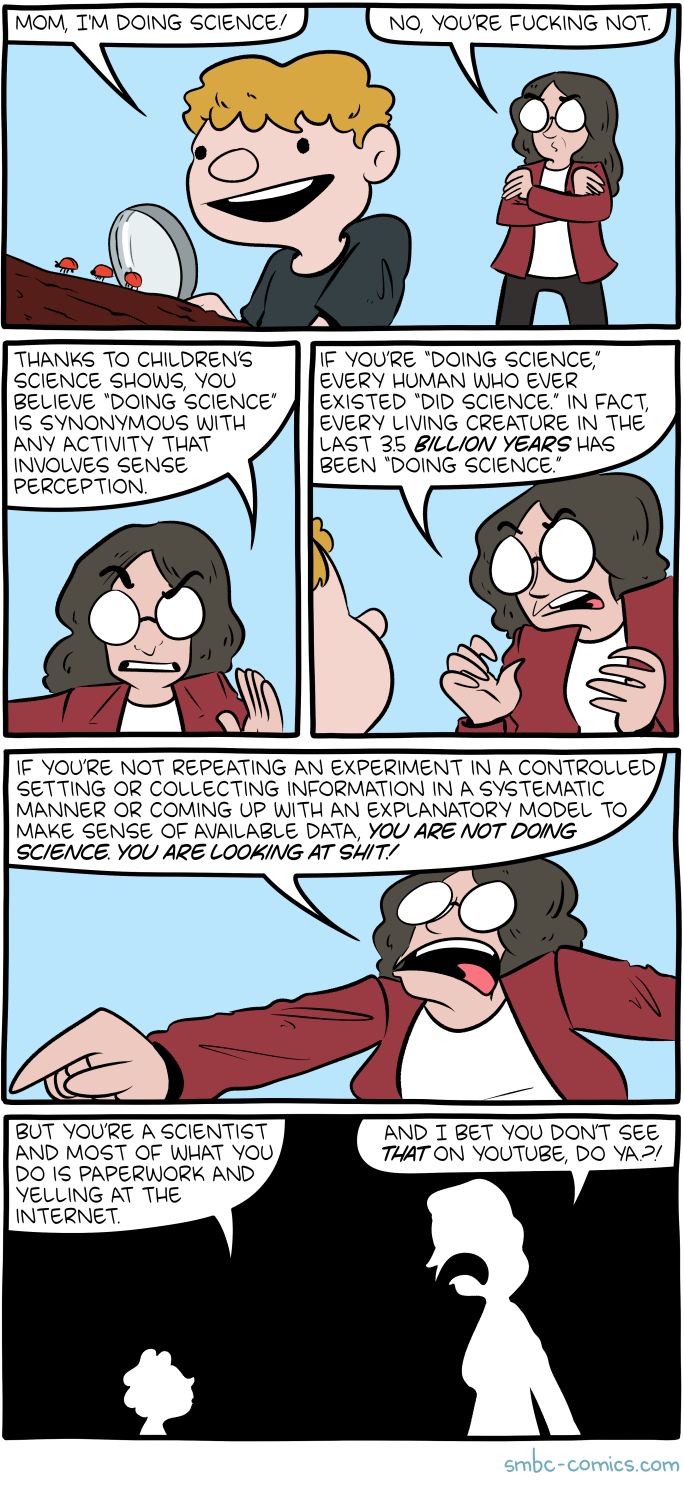
Hovertext:
Everyone about to send me an email, please just hug yourself instead.
“Good afternoon, my son. Would you enjoy a beverage?”
“Yes Mother I will wet deeply into myself.”
“We have, son, beverages three: coffee, which hot; milk, which cold; and, finally, the substrate of all beverage, itself also a genuine first-class beveroge when taken simpliciter.”
“I shell engorge each three in turn.”
"I love you zon.”
“And I you mather.”
Yuval Pinterwhere does "cataloguing their color distribution" fall
עושה רושם שקהילת דוברי העברית במדינת ישראל החליטה מתישהו בחודשים האחרונים, או בשנה האחרונה, לעבור מהמודל הלא-אנגלי של הגיית שנים כאילו הן מספר מונה (אלפיים [ו]תשע-עשרה) אל המודל הכן-אנגלי של פיצולן לשני מספרים בני שתי ספרות (עשרים עשרים ואחת). התיעוד שלי הוא אנקדוטלי, כי וואלה אף אחד.ת לא כותב.ת את שמה של השנה כהגייתה. בשביל זה יש לנו ספרוֹת.
לא שיש פה בעיה, כן? שתי הצורות מובנות וחד-משמעיות. אנחנו רגילים לחלוקות מוזרות במספרי מיקוד (תשעים מאתיים ועשר) וטלפון (מגדילים לעשות גלגלצ עם "תשעת אלפים ואז שתיים"), שבהם שרירותיות המספר גבוהה מאוד, ולא יהיה מופרך לטעון שמרגע שהתקבענו על מאה גם הספרות הראשונות של השנה הן די חסרות שימוש כיצורים מתמטיים.
ובכל זאת, מה גרר שינוי כה משמעותי בקטגוריה כה מהותית בשפה? זה לא שקודם לא היינו חשופים לניינטין-ניינטי-ניין, וזה לא שיש פתאום איזה יתרון הגייתי שלא היה קודם (ב"עשרים" יש הברה פחות מב"אלפיים" בספירה נדיבה, פחות חסכוני מ"תשע-עשרה" לעומת "אלף תשע-מאות"). הנחת העבודה שלי כרגע, ואשמח לשמוע תיאוריות מוצלחות יותר, היא שהמעבר לשנת אלפיים טרף את הקלפים (כולל באנגלית) עם עשור ראשון מאוד נטול סטנדרט (אנחנו עדיין לא סגורים.ות על איך לקרוא לעשור הארור ההוא, אם כי אני אישית מחבב את אפסטיז של עידוק), ואחרי ששקע קצת האבק, ועם בוסט קטן מאולימפיאדת טוקיו (היה שם איזה קטע חוקי לגבי השנה בשם, ומשם קצרה הדרך להאחדת-יתר), נכנענו כאומה לפורמט האנגלי (סוגריים). אני גם די בטוח שעוד לא יצא לי לשמוע הגייה של שנה שקדמה ל-2000 (או אפילו ל-2020?) בצורה הזאת, כך שיש כאן איזה איבון לקסיקלי, שכבה גיאולוגית מקובעת, ולא רפורמה רטרואקטיבית.
כ"ט בנובמבר שמח!
Today, on #LinguisticsWithSlava
The Russian word for a sports fan is "bolel'shchik." I'll explain in a minute. But first, did you know that for a long time Americans had no word for it?
Sports fans appeared in the US in the 1850s, but the word didn't come about until early XX c..— Slava Malamud (@SlavaMalamud) November 24, 2021
Slava Malamud goes on to explain the Russian relationship between fandom and pain:
The word "bolel'shchik" tells you all you need to know about the Russian approach. We did adopt the English word (in the form of "fanaty"), but it describes soccer hooligans exclusively.
"Bolel'shchik" is ours. Oh so very, very ours.
The root word is "bol", which means "pain"
"Bolet" is a verb derived from it. Its meaning is "to be ill." Therefore, "bolel'shchik" is someone who feels constant pain and/or is very sick. However, the word applies exclusively to sports supporters. A regular ill person is "bol'noi."
How Dostoyevskian is this shit?
The prevailing emotion of a Russian football fan (and this is where the word originated) is, of course, pain. Constant, unyielding feelings of sickness and discomfort that can only be understood if you ever sat on a wooden bench to watch a 0-0 slog in half-frozen mud in Saratov.
To support a sports team, in Russian culture, primarily means to experience pain, to be emotionally unwell, to subject one's mental health to voluntary mistreatment. To be unhealthily addicted to something bad.
Don't ever ask me why I root for the Buffalo Bills and Sabres again.
The OED glosses (the relevant sense of) fan as "A fanatic; in modern English (originally U.S.): a keen and regular spectator of a (professional) sport, originally of baseball; a regular supporter of a (professional) sports team; (hence) a keen follower of a specified hobby or amusement, and (gen.) an enthusiast for a particular person or thing", with citations back to 1682:
1682 ‘T. Rationalis’ New News from Bedlam 13 The Loyal Phans to abuse.
1682 ‘T. Rationalis’ New News from Bedlam 40 To be here Nurs'd up, Loyal Fanns to defame, And damn all Dissenters on purpose for gain.
1890 Omaha (Nebraska) Sunday Bee 2 Feb. ii. There has not been much enthusiasm shown among the baseball fans of the city.
1896 G. Ade Artie xvii. 158 I'm goin' to be the worst fan in the whole bunch.
1901 Dial. Notes 2 139 Fan, a base ball enthusiast; common among reporters.
The 17th-century quotes (about which more later) refer to politico-religious zealots rather than to sports-team supporters, and the OED's etymology notes that this "Abbreviation of fanatic adj. and n." was "Re-formed in 19th cent."
Wiktionary's etymology also suggests that this sense of fan , though derived from fanatic, was also "Possibly influenced by fancy (“group of sport or hobby enthusiasts”), fancy boy (“fan”), &c.", and the entry for fancy has senses:
7. Any sport or hobby pursued by a group.
Synonyms: hobby; see also Thesaurus:hobby
Trainspotting is the fancy of a special lot.
8. The enthusiasts of such a pursuit.
He fell out of favor with the boxing fancy after the incident.
As for fanatic, it comes from Latin fānāticus, which in turn is formed from fānum "temple".
Lewis & Short glosses fānāticus as "Inspired by a divinity, enthusiastic." Clearly this is the older sense of enthusiastic, which the OED glosses as "Designating a person who claims (falsely or erroneously) to receive divine communication or inspiration; […] also in wider sense: relating to, of the nature of, or characterized by mystical, fanatical, or radical religious delusion. "
A good example classical texts is this passage from Cicero's De Divinatione:
57. Sed, quod caput est, cur isto modo iam oracla Delphis non eduntur non modo nostra aetate, sed iam diu, ut modo nihil possit esse contemptius? hoc loco cum urguentur, ' evanuisse,' aiunt, ' vetustate vim loci eius, unde anhelitus ille terrae fieret, quo Pythia mente incitata oracla ederet.' De vino aut salsamento putes loqui, quae evanescunt vetustate. De vi loci agitur, neque solum naturali, sed etiam divina; quae quo tandem modo evanuit? 'Vetustate,' inquies. quae 'vetustas' est quae vim divinam conficere possit? quid tam divinum autem quam afflatus e terra mentem ita movens, ut eam providam rerum futurarum efficiat, ut ea non modo cernat multo ante, sed etiam numero versuque pronuntiet? quando ista vis autem evanuit? an postquam homines minus creduli esse coeperunt?
Demosthenes quidem, qui abhinc annos prope trecentos fuit, iam tum φιλιππίζειν Pythiam dicebat, id est quasi cum Philippo facere. hoc autem eo spectabat, ut eam a Philippo corruptam diceret. quo licet existimare in aliis quoque oraculis Delphicis aliquid non sinceri fuisse. sed nescio quo modo isti philosophi superstitiosi et paene fanatici quidvis malle videntur quam se non ineptos. evanuisse mavultis et extinctum esse id quod si umquam fuisset, certe aeternum esset, quam ea quae non sunt credenda non credere.
57. However, the main question is this: Why are Delphic oracles (of which I have just given you examples) not uttered at the present time and have not been for a long time? And why are they regarded with the utmost contempt? When pressed at this point their apologists affirm that 'the long flight of time has gradually dissipated the virtue of the place whence came those subterranean exhalations which inspired the Pythian priestess to utter oracles.' One might think that they are talking about wine or brine which do evaporate. But the question is about the virtue of a place—a virtue which you call not only 'natural' but even 'divine,'—pray how did it evaporate? 'By length of time,' you say. But what length of time could destroy a divine power? And what is as divine as a subterranean exhalation that inspires the soul with power to foresee the future—a power such that it not only sees things a long time before they happen, but actually foretells them in rhythmic verse? When did the virtue disappear? Was it after men began to be less credulous?
By the way, Demosthenes, who lived nearly three hundred years ago, used to say even then that the Pythian priestess 'philippized', in other words, that she was Philip's ally. By this expression he meant to infer that she had been bribed by Philip. Hence we may conclude that in other instances the Delphic oracles were not entirely free of guile. But, for some inexplicable cause, those superstitious and half-cracked philosophers of yours would rather appear absurd than anything else in the world. You Stoics, instead of rejecting these incredible tales, prefer to believe that a power had gradually faded into nothingness, whereas if it ever had existed it certainly would be eternal. [source]
And this leads us to the 17th-century examples (diversely spelled, by the same author, as "Phans" and "Fanns"), which come from a political screed with a spectacularly exuberant 151-word title:
New News from BEDLAM:
OR More Work for Towzer and his Brother Ravenscroft. ALIAS Hocus Pocuus Whipt and Stript:
OR a Ra-ree New Fashion CUPPING-GLASS Most humbly represented to the Observator
Wherein the various Shapes , and present Legerdemain Postures, Principles and Practices of the bold and most Insolent Factors for the infallible Chair (both in Church and State) are yet more and more unvailed and discovered.
As it was lately Represented in a plain honest Country Dialogue, (viz. both Serious, Comical, Satyrical, Tragical and Theological) to a True Loyal Protestant-Association of Master and Scholars, to be Acted by them at the next Breaking up of their Grammar-School, and then, and there, it is shrewdly suspected (by a Vote of Nemine Contradicente) 'twill be Resolved, That a Second Impression of the said Dialogue, with Appurtenances, shall be forthwith promoted and Published for the present Satisfaction and farther Information of the People.
By Theophilus Rationalis, one of Heraclitus Ridens, Nat Thompson's, and the most profound Observator's Wise Men of Gotham, although a most Sincere, and True Lover of King and Country.
Post Tenebras Splendet, surgit post Nubila Phoebus.
Theophilus Rationalis was apparently a pseudonym for Henry Duke, about whom I haven't been able to learn anything more.
You can look through the book yourself to find the contexts of Phans and Fanns.
And of course there's also stan — see "K-pop stans troll Trump", 6/22/2020.
Update — Antedating the OED's first baseball fan citation, here's the Kansas City Times for May 1, 1886:
“Did three inventions today.”
“Uh huh.”
“Yup, three. You might think of your old man as just a tired old crooner, but I still got some new hits in me. I invented three new things in the lab today. They're out in the garage, if you wanna go look.”
“Uh huh. What are they.”
“Okay, sure, I can just tell you, sure. Okay, the first invention. Now, have you ever gotten tired of how when you microwave food it sometimes pops? Well I invented something for that. Anti-pop food warming box.”
“Alright. Sounds useful. Box. What else.”
“I invented a new kind of tire. A lot like the old kind, but it's spray-painted red.”
“Got it. Third?”
“I invented a child who isn't perpetually ungrateful. Ha ha, just kidding, that doesn't exist. I invented a new kind of toaster that screams when the toast is done.”
התרגום הקלוקל שמתקבל לעתים כתוצאה של תרגום אוטומוטי, לרוב של גוגל.
בשונה מהערך ״תרגוגל״ (תרגום גוגל), ״תרגום גלוגל״ מכיל ביקורתיות על התוצאה.
״לא הבנתי מילה, התרגום שמוצג כאן גלוגל לגמרי.״
״אולי כדאי שמישהו יגיה את התרגום. הוא גלוגל.״
נתרם ע״י: לא ב. ראש׳לי.
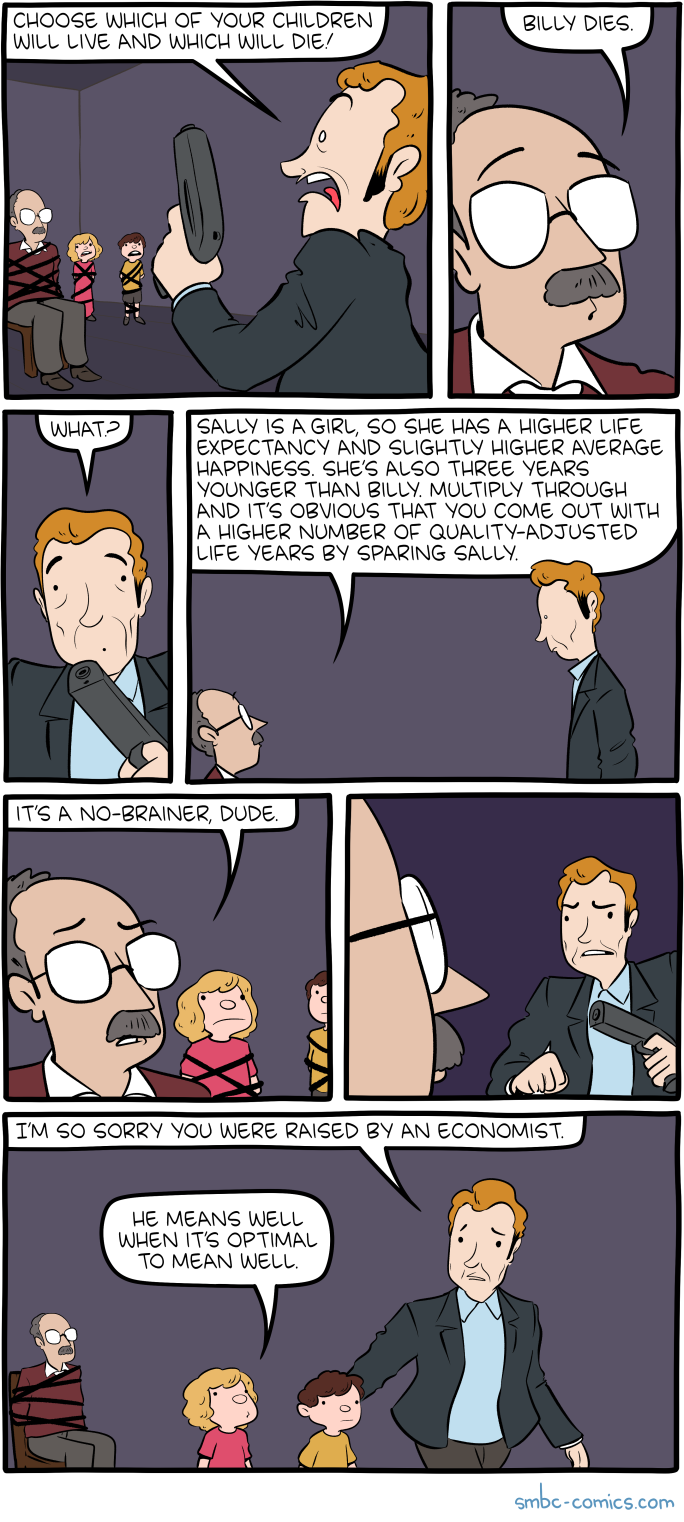
Hovertext:
Unfortunately it's often just a local optimum.

Hovertext:
Can we just cancel sex? Is it too late? The whole thing just got creepy.
Yuval Pinterum,
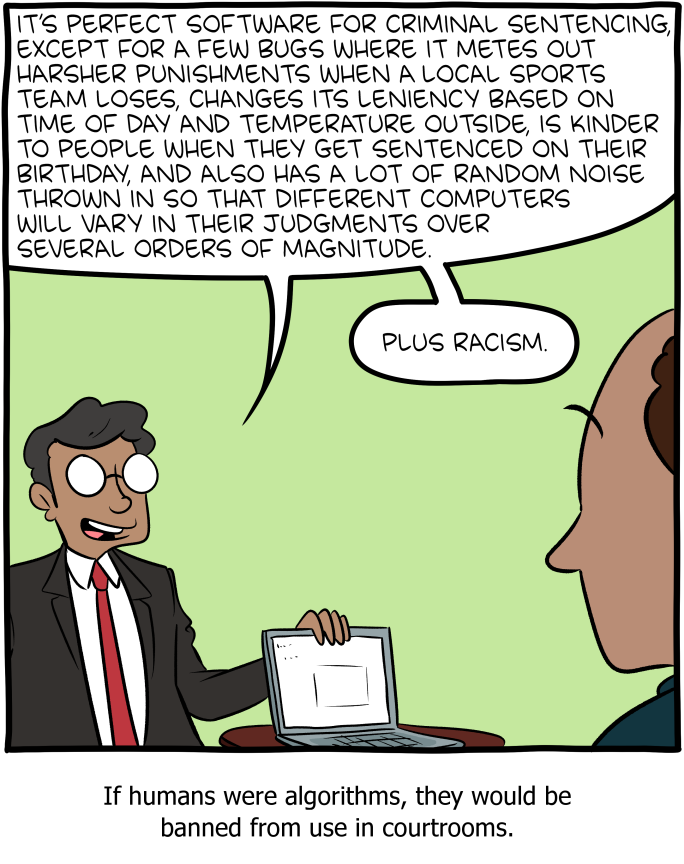
Hovertext:
All examples from the book Noise, by Kahneman, Sibony, and Sunstein, which I'm enjoying right now.
This is pretty juvenile, but hey, we all have an inner twelve-year-old hidden within our mature selves, and I figure others might enjoy it as much as I did, so without further ado, from David A. Cox’s reminiscence of his fellow mathematician Steven Zucker (“‘Steve’ to everyone who knew him”; from here):
I met Steve in the fall of 1970 when we were entering graduate students at Princeton. We both studied algebraic geometry, though I was more algebraic (à la Grothendieck) while Steve was more transcendental (à la Griffiths). This made for some lively conversations. A few weeks after we met, we realized that we had to write a joint paper because the combination of our last names, in the usual alphabetical order, is remarkably obscene.
See: Cox–Zucker machine. (Via Avva.)